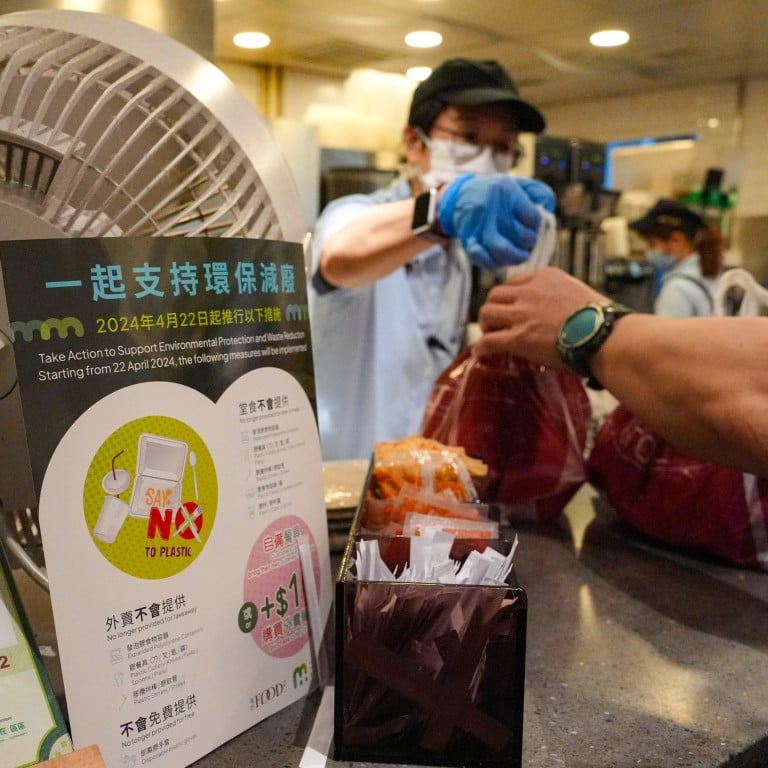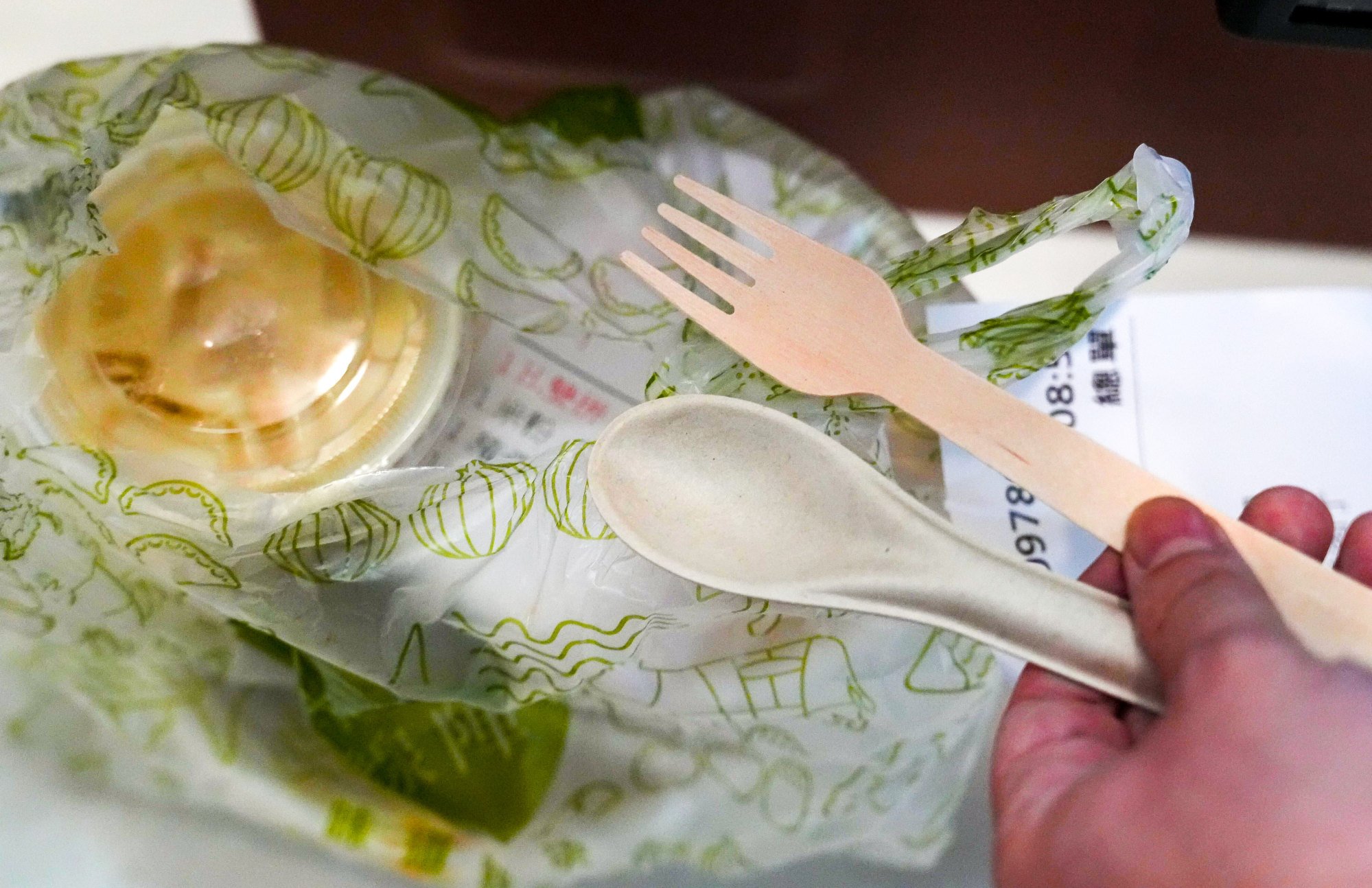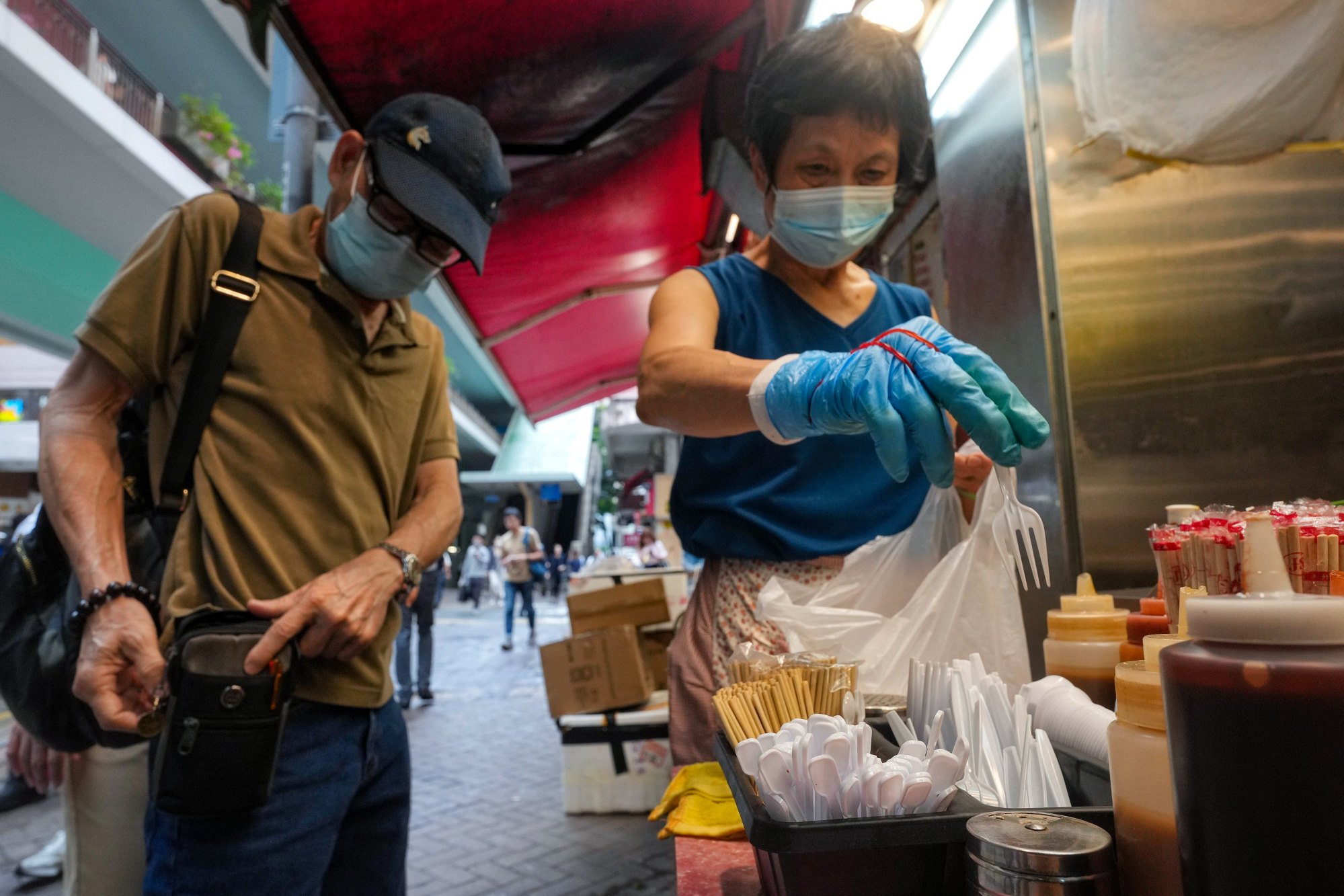
Hong Kong’s single-use plastics ban begins with little disruption at restaurant chains
- Most customers at chain outlets in busy business district decline to pay extra for alternatives to plastic cutlery as ban gets under way
- But industry head says about 70 per cent of eateries citywide yet to offer alternatives to prohibited items amid six-month grace period
But Simon Wong Ka-wo, president of the Hong Kong Federation of Restaurants and Related Trades, said about 70 per cent of his organisation’s 18,000 eateries were yet to offer alternatives to the prohibited items amid a six-month grace period.
Some small businesses also said they still needed to clear the last of their stock of plastic cutlery and styrofoam boxes.
“We still have a few more bags of plastic tableware left, and we will start giving wooden and paper cutlery after they are used up,” said Gary Ngan, owner of a snack shop in Wan Chai.
He added he would provide the items until they ran out, and had no plans to charge customers extra for the new alternatives.
Under the first phase of the ban, styrofoam products and throwaway plastic utensils such as cutlery and straws were banned for takeaway purchases.
Single-use plastic tableware was no longer available to patrons dining in.
Most customers in a busy shopping district in the morning, meanwhile, opted for their own utensils when buying takeaway food and drink instead of paying extra for alternatives, as observed by the Post.
Restaurant chain outlets in Admiralty, including Cafe de Coral, Mixian Sense, can.teen and Oliver’s Super Sandwiches, were charging customers HK$1 (13 US cents) for utensils, mostly wood or paper-based, when buying takeaway.
KFC and McDonald’s had fully switched to wooden cutlery for both dine-in and takeaway.
But most customers chose not to fork out the extra HK$1, according to staff members from the outlets.
Wing Lai, a clerk in his 40s who bought breakfast on his way to work, said he did not buy the utensils because his office provided reusable ones.
“Nobody in our office uses disposable utensils, some even bring their own boxes. I am already one of the less eco-friendly staff among them,” he said.
“The policy itself is a good initiative, otherwise our landfills will soon be full.”

Lai said he would also consider ditching paper straws after he found a better alternative to stainless steel ones, and he could not dine-in for breakfast due to time constraints.
Mandy Wan, a dentist assistant in her 30s, started bringing her own reusable utensils because she was not happy with the quality of non-plastic ones.
“The policy is for a good cause but some alternatives simply do not work – the paper spoons can’t hold anything, so I bring my own.”
A clerk surnamed Yau, meanwhile, said that because of the policy she kept a hundred sets of disposable plastic cutlery in her office, which she bought for less than HK$20 from a wholesaler.
“It’s not about the HK$1 utensil charge, but the quality of the alternatives, the paper cutlery just softens too quickly in hot soup,” she said.
“I may consider switching to reusable cutlery in future, but washing them every day is a hassle.”
Among those who decided to pay for wood-based cutlery was John So, a 29-year-old worker in the surveying industry.
“I know many people have complained about the quality of the alternative utensils, I will see for myself if that’s true today,” he said.
“If they are not usable, I will simply buy throwaway plastic cutlery from the supermarket, they are much cheaper.”
But So said he would not consider bringing his own utensils: “If I had the time, I would bring my own lunch.”
Joyce Chiu, director of corporate communications and sustainability at Cafe de Coral Holdings, said the chain reported fewer customers opting for takeaway in residential districts, with the proportion dropping from 40 per cent to 20 per cent.
Among those still buying takeaway items, only a quarter paid for the utensils, Chiu said, adding her firm implemented a plastic ban one week ago.
Industry head Wong said the financial impact of switching utensils might be passed on to consumers, but rising costs still remained acceptable for operators.
Paper or bamboo straws might be 30 per cent more expensive, he said, but he expected costs to fall as mass production ramped up.
Some small businesses said they had not yet ditched the plastic items and styrofoam boxes because they were clearing the last of their stock, including a cha chaan teng in Wan Chai.

Its owner, surnamed Yeung, said those items were the last in his stock and he would soon switch to eco-friendly cutlery as suggested by the government.
“What’s the point of making such a big fuss when business is so slow? They should come down to see it for themselves,” he said. “Later we will need to charge HK$2 extra for those getting takeaway.”
Under the six-month grace period, enforcement action will only be taken if repeated advice is ignored.
Some products with non-plastic alternatives, such as cotton buds, umbrella covers, and glow sticks, are also banned.
Hotels and guest houses will be barred from supplying free toiletries in synthetic disposable containers and free in-room water in plastic bottles.
Businesses that breach the ban face a maximum fine of HK$100,000. They may also receive a HK$2,000 fine under a fixed penalty system.
The last straw: will online shopping loophole hinder Hong Kong plastic ban?
The second phase of the policy is expected to launch next year and will ban plastic table coverings, gloves and floss sticks, among other items.
Weighing in on some of the negative feedback heard ahead of the ban, Wong said the smell of alternative utensils was not a big concern.
“It is just a matter of habit. For example, there are also some plastic utensils which smell,” he noted.
He said the best solution for those diners was simply to use their own cutlery.

